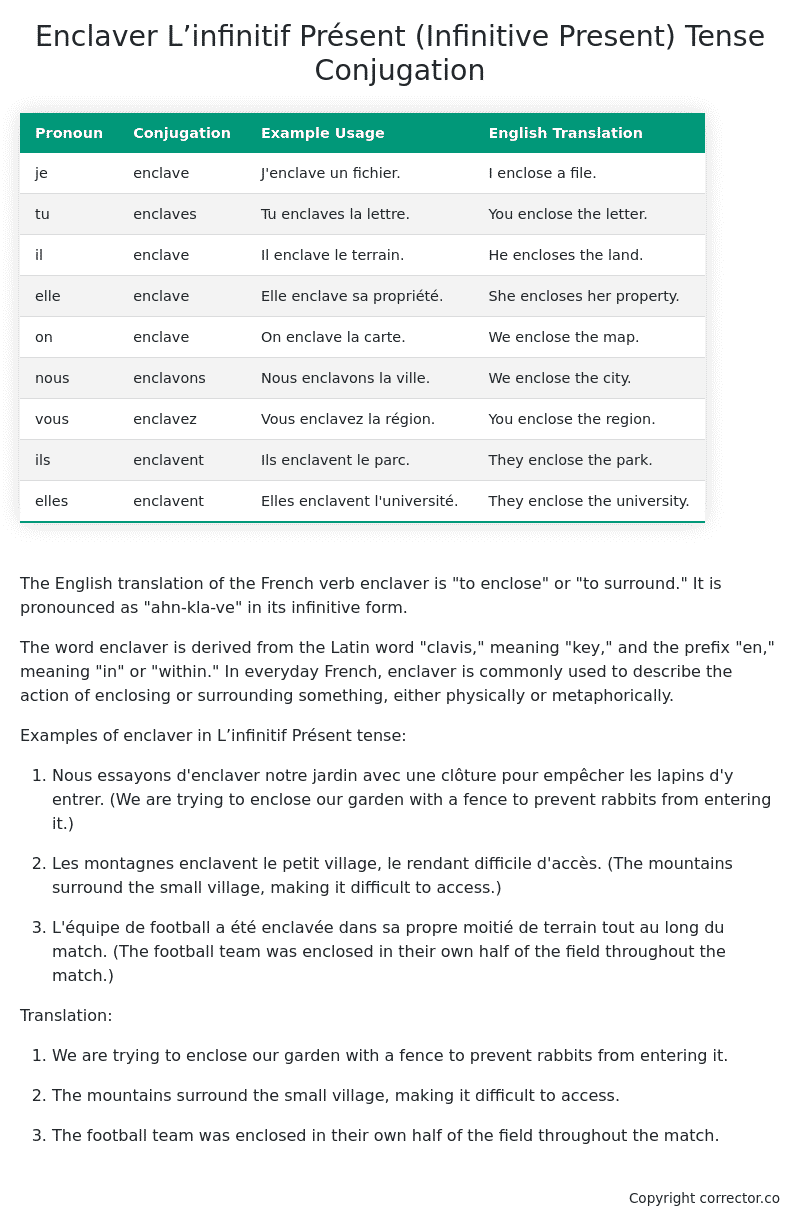L’infinitif Présent (Infinitive Present) Tense Conjugation of the French Verb enclaver
Introduction to the verb enclaver
The English translation of the French verb enclaver is “to enclose” or “to surround.” It is pronounced as “ahn-kla-ve” in its infinitive form.
The word enclaver is derived from the Latin word “clavis,” meaning “key,” and the prefix “en,” meaning “in” or “within.” In everyday French, enclaver is commonly used to describe the action of enclosing or surrounding something, either physically or metaphorically.
Examples of enclaver in L’infinitif Présent tense:
-
Nous essayons d’enclaver notre jardin avec une clôture pour empêcher les lapins d’y entrer. (We are trying to enclose our garden with a fence to prevent rabbits from entering it.)
-
Les montagnes enclavent le petit village, le rendant difficile d’accès. (The mountains surround the small village, making it difficult to access.)
-
L’équipe de football a été enclavée dans sa propre moitié de terrain tout au long du match. (The football team was enclosed in their own half of the field throughout the match.)
Translation:
-
We are trying to enclose our garden with a fence to prevent rabbits from entering it.
-
The mountains surround the small village, making it difficult to access.
-
The football team was enclosed in their own half of the field throughout the match.
Table of the L’infinitif Présent (Infinitive Present) Tense Conjugation of enclaver
| Pronoun | Conjugation | Example Usage | English Translation |
|---|---|---|---|
| je | enclave | J’enclave un fichier. | I enclose a file. |
| tu | enclaves | Tu enclaves la lettre. | You enclose the letter. |
| il | enclave | Il enclave le terrain. | He encloses the land. |
| elle | enclave | Elle enclave sa propriété. | She encloses her property. |
| on | enclave | On enclave la carte. | We enclose the map. |
| nous | enclavons | Nous enclavons la ville. | We enclose the city. |
| vous | enclavez | Vous enclavez la région. | You enclose the region. |
| ils | enclavent | Ils enclavent le parc. | They enclose the park. |
| elles | enclavent | Elles enclavent l’université. | They enclose the university. |
Other Conjugations for Enclaver.
Le Present (Present Tense) Conjugation of the French Verb enclaver
Imparfait (Imperfect) Tense Conjugation of the French Verb enclaver
Passé Simple (Simple Past) Tense Conjugation of the French Verb enclaver
Passé Composé (Present Perfect) Tense Conjugation of the French Verb enclaver
Futur Simple (Simple Future) Tense Conjugation of the French Verb enclaver
Futur Proche (Near Future) Tense Conjugation of the French Verb enclaver
Plus-que-parfait (Pluperfect) Tense Conjugation of the French Verb enclaver
Passé Antérieur (Past Anterior) Tense Conjugation of the French Verb enclaver
Futur Antérieur (Future Anterior) Tense Conjugation of the French Verb enclaver
Subjonctif Présent (Subjunctive Present) Tense Conjugation of the French Verb enclaver
Subjonctif Passé (Subjunctive Past) Tense Conjugation of the French Verb enclaver
Subjonctif Imparfait (Subjunctive Imperfect) Tense Conjugation of the French Verb enclaver
Subjonctif Plus-que-parfait (Subjunctive Pluperfect) Tense Conjugation of the French Verb enclaver
Conditionnel Présent (Conditional Present) Tense Conjugation of the French Verb enclaver
Conditionnel Passé (Conditional Past) Tense Conjugation of the French Verb enclaver
L’impératif Présent (Imperative Present) Tense Conjugation of the French Verb enclaver
L’infinitif Présent (Infinitive Present) Tense Conjugation of the French Verb enclaver (this article)
Struggling with French verbs or the language in general? Why not use our free French Grammar Checker – no registration required!
Get a FREE Download Study Sheet of this Conjugation 🔥
Simply right click the image below, click “save image” and get your free reference for the enclaver L’infinitif Présent tense conjugation!

Enclaver – About the French L’infinitif Présent (Infinitive Present) Tense
Forming the Infinitive Present
Common Everyday Usage Patterns
As a Verb’s Dictionary Form
After Modal Verbs
As an Imperative
In Infinitive Clauses
Interactions with Other Tenses
Present Tense
Future Tense
Conditional Tense
Passé Composé
Imperfect Tense
Subjunctive and Conditional Moods
Summary
Want More?
I hope you enjoyed this article on the verb enclaver. Still in a learning mood? Check out another TOTALLY random French verb conjugation!


